'Pain and fear dominate my thoughts. I can't get up. Nothing is responding to my mental commands; I'm ignored by my own body'
Former jockey Jacob Pritchard Webb with a moving account of the day his life changed forever
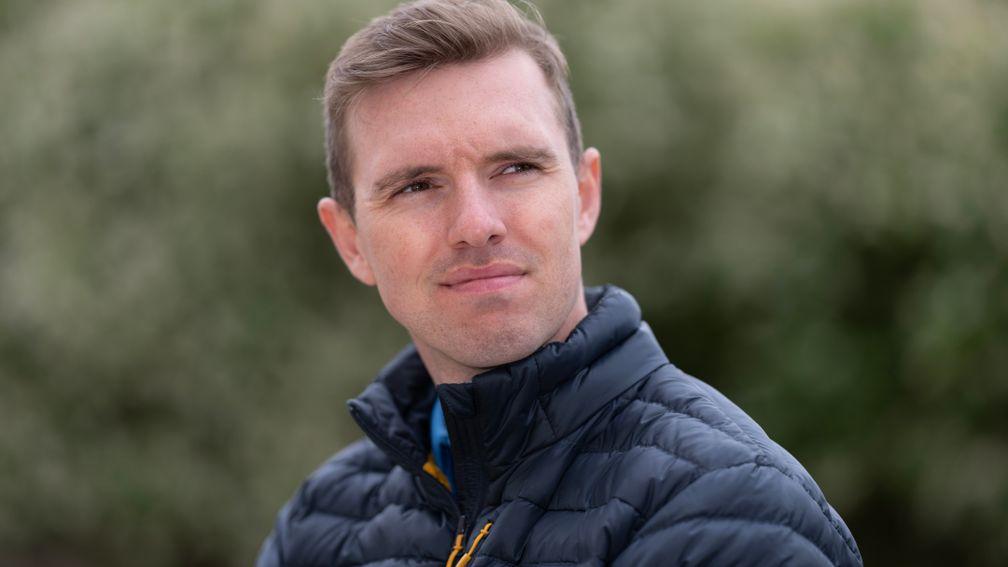
Fate decreed that May 25, 2020 turned out to be the last day I rode a winner, although of course at the time I didn't have a clue that would prove the case.
I was riding at Chateaubriant, a small track in the west of France. My mount was Kaplyma, who had blinkers on for the first time and took off with me, head down, charging through a gap the width of the Suez Canal with a circuit to go winging hurdles for fun. We won by 23 lengths and had I known that she would be my last ever winner I would have celebrated after the five-hour journey home with something more than just a Maccy D.
The next five weeks were a struggle both on the track and off. I was out of the placings on my next nine rides and thanks to the French racing calendar those took place over the space of a month, unlike the jockeys in Britain who would have that number of rides in two days.
My last weekend of professional riding provided a third-place finish back on Kaplyma and a second on a small, sweet filly called Cidje Dangles. I rode two seconds on her, with Charlotte Prichard, a close friend, beating me by a length on what proved to be the last completed ride of my life. I still think I rode the perfect race but we were just beaten by a better combo on the day.
As it happens, Charlotte was the next person to ride a winner on Cidje, as I recommended her to the trainer. A lovely gesture I know but quite sickening too. The world works in funny ways.
The following Monday I was booked in to see a chiropractor to inspect my back. I was in no pain, but the last fall I had, at Paray-le-Monial in a contest whose format resembled nothing so much as Wacky Races, left me needing X-rays. I wanted to be in the best possible shape before having two rides at Auteuil the next day – Tuesday, June 22. One was for trainer Bertrand Lefevre, my most successful partner having had five winners together, and the other for Serge Foucher, the man who once had Kauto Star.
The morning of that life-changing Tuesday started quite spectacularly, riding out for David Cottin for the first and only time in Chantilly. I was able to ride a filly on the four-kilometre Piste des Lions through the trees. It was as wide as most racecourses with an incline that isn't seen on any French tracks. However, the morning took a turn when I left to drive to Auteuil, getting stuck in heavy traffic outside the Stade de France. Looking up at the metal colossus, I sat there in despair thinking, "I can't believe I'm going to miss my first ride".
Whether I deem it to be lucky or very unlucky to have made it to the track changes from day to day. But make it I did and over the moon I was.
The sun started to break through as I walked out into the picturesque paddock that has welcomed so many champions over the years. Galant Des Boulats, my ride, wasn’t an overly big horse but was attractive and athletic and had run a great race last time at Pau over fences. I fancied my chances if I could settle him.
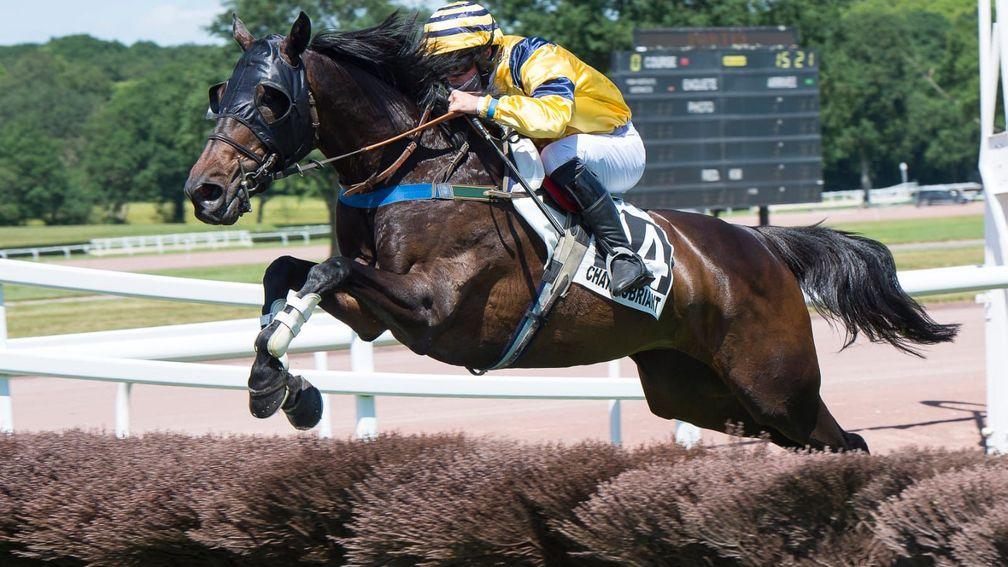
I swung my leg over and we made our way down to the practice hurdle on the Polytrack next to the course. He bounded over with spring-heeled ease. So far so good.
He was on his toes as the tape went up and we settled mid-division at a speed I wasn't expecting. French racing is supposedly run at a snail's pace with a sprint finish, but none of these would be sprinting home as we winged the double barrier and swung into the first right-handed turn. Approaching far too quickly for my liking was the bull finch, a large bush-like obstacle with a solid base. It can take horses by surprise as they can't see through it but he landed in fourth and I was happy with how things were going, jumping well and travelling nicely.
The Oxer is the smallest fence at Auteuil. It's no higher than a French hurdle but double the width with a gap in the middle. I sat still. He'd pop this before the Rivière des Tribunes. That was the jump I was afraid of. I never got that far. Always expect the unexpected in this game.
He pecks, I pull the reins to save him. Nothing happens. He can’t be saved. There is no noise after I hit the ground head first. For a split second I feel nothing until I rotate and pain shoots through my back; there's a tingle, then nothing. It's not that the pain has gone away; that's growing by the second, a stabbing pain through my spine and out my chest. But everything below feels lost.
As someone runs over, I shout that my legs are in the air. The brain has played a trick and the track attendant is puzzled as he looks at my perfectly still body, motionless. Next comes the shortness of breath. It must be ribs, but the pain dominates my thoughts along with the fear that's sweeping over me. I can't get up. Nothing is responding to my mental commands; I'm ignored by my own body.
Unable even to sit up and spew
What happened next was a whirlwind. Eventually, I was picked up and placed into an ambulance. Felix de Giles tried to join me but was denied – bloody Covid. A phone was handed to me; it's ringing. It was Mum. She asked the obvious, terrified of the answer. Unfortunately, it's a yes and the next six months of her life in France begins.
All I could say to the paramedic on the journey to the hospital was: "I don't want to die." Which hospital I'm at wasn't a concern to me; getting rid of the pain was. That was all that was consuming my thoughts as I was asked questions I couldn't give a fuck about. Just get me out of this pain.
The reality of my situation didn't hit me until I was surrounded by what felt like 20 people bustling around me. They started to take off my boots – I knew this because I heard the zip go. These were made-to-measure boots so aren't the easiest to remove by myself. But remove them they did, and feel it I did not.
Next came the tight leg wraps, the breeches, the tights, the cycling shorts and boxers. None of which was felt. Becoming naked without my say-so or being able to exercise any control over the situation, while still being awake and fully conscious, was when I finally cried. Not because the room was cold and I was not at my most impressive, but because the realisation that I cannot move and I cannot feel a single thing from my chest down finally hit me.
Later, I was taken for a CT scan to see what damage was done. They needed a pen full of ink to list the injuries, but nothing was relayed to me. I was in and out of consciousness and from lying stark-bollock naked in front of what felt like the whole medical team to entering the Star Trek-like scanner isn't in the memory bank from that day.
The noise of the scanner brought me around, however, followed by the honey-like syrup that is injected into you. A dye known as contrast entered my bloodstream. If the whole situation wasn't scary enough, the side effects that dye causes certainly didn’t help. Nausea overwhelmed me in a second followed by pathetic retching from a pair of lifeless lungs. In the grand scheme of things this was a minor inconvenience to the radiographers attempting to see what was wrong with me but, to me, the consequences of being paralysed hit me with full effect when I was unable to sit up and spew. Choking on my own vomit, after all that? What a shit way to die, I thought.
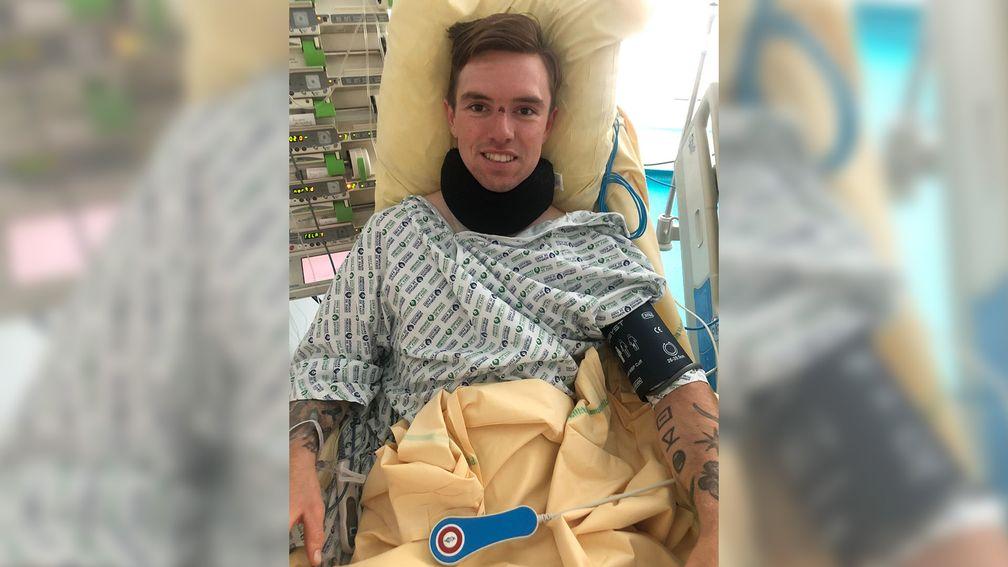
There was no beaming me up, but the lights indicated it was surgery time. If I had been told what had happened and what they were going to do it hadn't registered. My reply to being told I was going under the knife was "go for it".
The shakes had started and not because of the air conditioning. If I could have curled up in a ball, I would have done so from the band of pain that had formed and was tightening with every minute around my ribcage. I have never known pain like it and I hope I never do again. They couldn't count to ten quick enough as the mind-numbingly good gas entered my limp body and pushed the pain far, far away.
From 23 seconds to 23 minutes
It was three weeks before I felt anything. Whether it was a tingle or electricity running from my toe up my leg along my body and to my brain and back, who knows. I certainly didn't; just one day it's like the cogs in my brain that powered the sensation part started working again, one at a time.
Nerves are incredible because it took only two weeks for me to have regained some sort of sensation all over my body. I still to this day can't decide whether that is a good or a bad thing. To recover that in such a short space of time gave me and everyone around me huge amounts of hope – except for the doctors. They aren't ones for giving much hope, which is understandable, and thankfully had the effect of giving me the drive to improve: "Do you know what, I'll prove you wrong."
Unfortunately, the brain may have thought that, but the body wasn't on the same page. I was in that first hospital for eight weeks. I went from bed-bound to sitting up for the first time and nearly fainting, swinging my legs over the bed when sat up and nearly fainting, and then to standing up where, you guessed it, I nearly fainted.
Thankfully, I can do all those things now without nearly fainting but back then it wasn't a very pleasant experience trying to relearn all the mundane things I previously took for granted. Especially standing up. God, what a joy that used to be. Nowadays I need a standing frame in order to do so by myself. It's a static wood or metal frame which traps my feet in place, with a strap that blocks the front of my knees, and as I haul myself up a strap is then fitted behind my bum which I can then lean back into while holding on to a table.
The first time I did this I lasted 23 seconds. By the end of the eight weeks, I could do 23 minutes. Result, I thought, until Freddy Tylicki challenged me to beat his personal best which is three hours. I'm still working on it.
Not only did I work on that, I started seated balance again through playing catch – harder than it seems without core function – and I got back on the weights to rebuild my arm strength.
Most important, though, was getting into a morning routine for my bowels, something which is so important in order to avoid accidents if possible. Nothing worse than shitting yourself uncontrollably, trust me.
The hardest time of my life
Danielle, my physio, was one of a kind; small in stature but big in heart. I met her at the rehabilitation hospital in Garches, to the west of Paris, where I would spend the next four months going through the repetitive tasks that would help me get through life in a manual wheelchair.
Her torture room was in the basement of the hospital and the large room had five benches for the physios to work on their patients. From day one she told me what I needed to hear: "You can be independent and lead an independent life in a wheelchair, so let's start now."
It's fair to say I went through every emotion with Danielle in that physio room. Struggling to transfer from the chair to physio plinth was only the beginning. She had me on the dumbbells from the word go, which at the time I was cursing her for, but now I’m grateful for the beasting she gave me.
Two months down the line she had me on the floor trying to transfer me back into my chair – a fiddly process that takes a bit of skill, determination and power. The dumbbells helped after all, although some tears were shed along the way with a side helping of pain.
Pain was not my friend and still isn't. From week two to week ten I would come back after morning physio and just get back on my bed to have lunch followed by a nap to escape the wheelchair. The muscles that could work were on overtime daily with little to no rest. My desire to improve and become better at this new life I had to lead was putting an enormous amount of stress on my arms. My new legs screamed at me daily under the pressures I was putting them under. All I could think about was hitting and reaching the goals set for me by the team at the hospital in order to get out of there quicker.
Not all the times were bad, though, and throughout my time hospitalised in France I had Mum and Dad by my side. From lunchtime until they were kicked out, they stayed with me. They were the core of a rather large team of people who helped me get through the hardest time of my life.
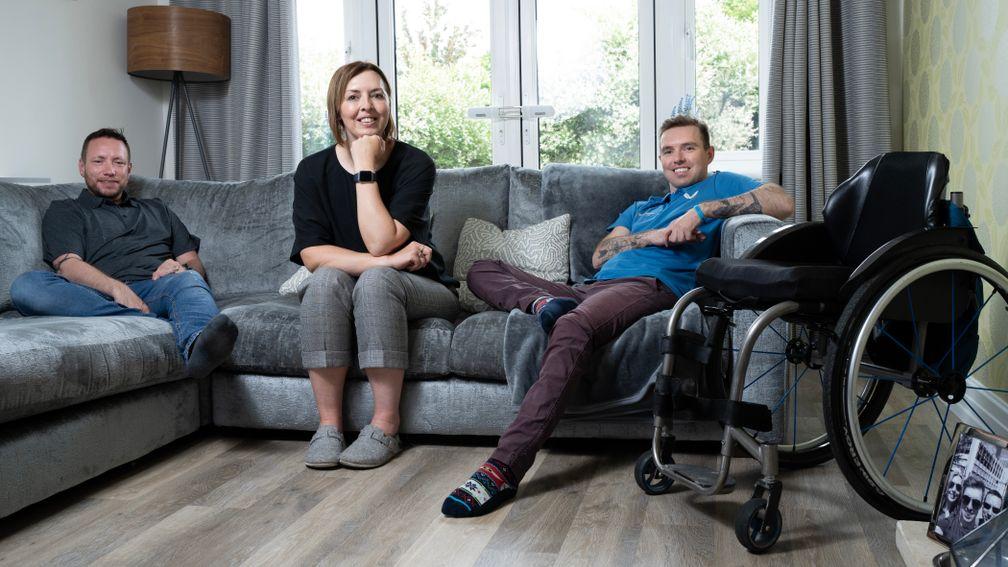
Maybe I was lucky after all
From a week after arriving at Garches, the doctors had been talking to me about leaving the hospital, initially just for a day trip, but in time overnight, then for two days – and so on. Looking ahead is all you can do in hospital. One date in the diary that stuck out was a day's racing at Longchamp for the Prix de l'Arc de Triomphe.
I'd never been before and didn't follow the Flat much when I was riding out there, but my friends Helen and Patrick Barbe, who helped me with all the French paperwork, had some clients coming over and had told me, if I was up to coming then I'd be spoiled. That was my goal, my focus, to be able to be strong enough to last in the chair for eight hours-plus, manage my bladder throughout the day, and not have an accident that would stink out the entire third floor of the grandstand.
I had two months to be ready, which sounds a lot. But it wasn't just physically that I had to prepare myself; it was mentally too. And I had to buy a new suit, which isn't easy either. After a bit of online shopping and a small trip to the shops, a dapper suit was bought and I had prepared myself in time for October 3.
I was buzzing. Rolling through the gates looking up at all that gold made for an impressive sight. The view was made better by the lack of people due to Covid restrictions so I had plenty of space to feel comfortable in an unfamiliar environment and we did a recce of the area before the races had begun.
Helen found us and said she had a surprise for me. We made our way to the lift in the grandstand and she pressed the 4 button. That took us all the way to the top to the private boxes and she explained that their client had a half-share in Japan and, as none of the Aidan O'Brien horses were running, Coolmore gave them their private suite for the day.
It's hard to explain how cool it felt entering that suite. It was a champagne arrival and the bubbles couldn’t have been better.
As I made my way across the room, drawn to the glass balcony, I passed memories of past champions who had cemented their place in French history such as Found and Dylan Thomas. Overlooking the track, I could see the Eiffel Tower in the distance, just as I could from my bed in the first hospital after my accident. Then the suite door opened to the best surprise of all. Yutaka Take, the Japanese riding legend, walked in. I was gobsmacked. He made his way around the room until he got to me and sat down.
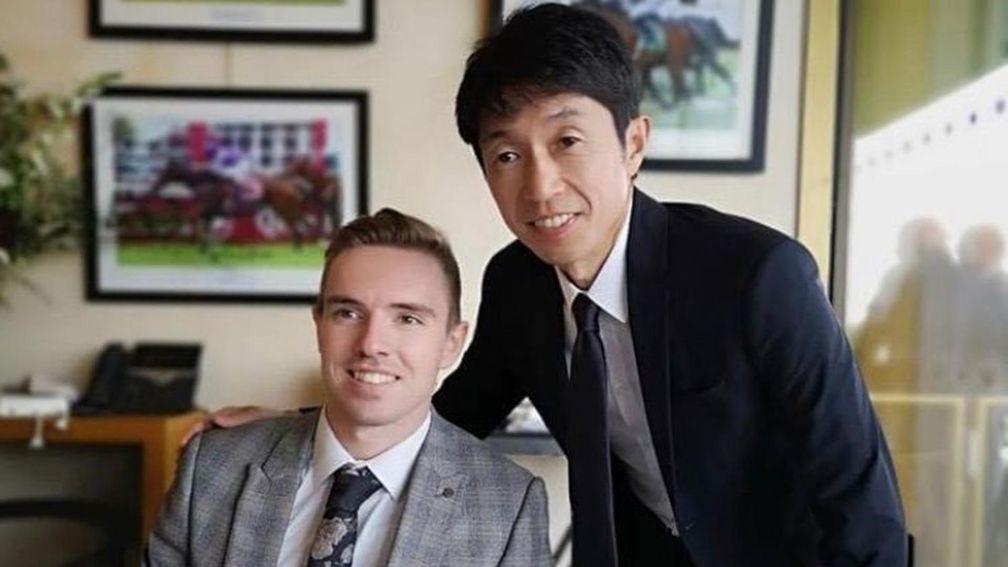
In that very moment I remembered racing was on at Strasbourg and thought, "Here I am, at the Arc de Triomphe, in the Coolmore suite, sat next to Yutaka Take sipping on champagne, instead of riding some scary beast out in the east".
Maybe I was lucky after all to not get back on a horse. It is a twist of fate that has opened up so many new doors and led to countless pathways I would never have encountered before. That's another story, but I know this: the life I must now have is harder, for sure, but not worse.
Read these next:
Frankie Dettori: 'If I make a balls-up, who cares? I'm about to retire anyway'

Sign up to receive On The Nose, our essential daily newsletter, from the Racing Post. Your unmissable morning feed, direct to your email inbox every morning.
Published on 24 June 2023inThe Big Read
Last updated 11:36, 25 June 2023
- 'There's a time to be serious because it's a multi-million-pound business - but you've got to have a laugh'
- Internal unrest and financial blows: is there a crisis brewing at the Jockey Club?
- 'There was a moment of rage - but he's a magnificent horse and it suits me that he's passed under the radar'
- Richard Hannon: 'When you're dead and buried the only things you're remembered by are your Classic winners'
- 'I'd try to join in with the kids playing football and the pain would shoot up my leg - it wasn't a good place to be'
- 'There's a time to be serious because it's a multi-million-pound business - but you've got to have a laugh'
- Internal unrest and financial blows: is there a crisis brewing at the Jockey Club?
- 'There was a moment of rage - but he's a magnificent horse and it suits me that he's passed under the radar'
- Richard Hannon: 'When you're dead and buried the only things you're remembered by are your Classic winners'
- 'I'd try to join in with the kids playing football and the pain would shoot up my leg - it wasn't a good place to be'